Related Research Articles
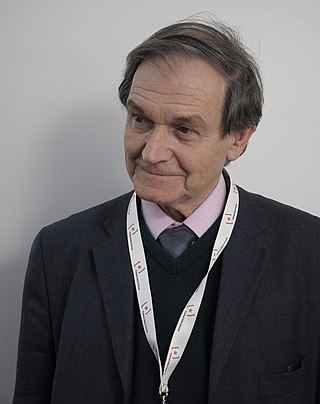
Sir Roger Penrose is an English mathematician, mathematical physicist, philosopher of science and Nobel Laureate in Physics. He is Emeritus Rouse Ball Professor of Mathematics in the University of Oxford, an emeritus fellow of Wadham College, Oxford, and an honorary fellow of St John's College, Cambridge, and University College London.
0 (zero) is a number representing an empty quantity. Adding 0 to any number leaves that number unchanged. In mathematical terminology, 0 is the additive identity of the integers, rational numbers, real numbers, and complex numbers, as well as other algebraic structures. Multiplying any number by 0 has the result 0, and consequently, division by zero has no meaning in arithmetic.

Charles Hoy Fort was an American writer and researcher who specialized in anomalous phenomena. The terms "Fortean" and "Forteana" are sometimes used to characterize various such phenomena. Fort's books sold well and are still in print. His work continues to inspire admirers, who refer to themselves as "Forteans", and has influenced some aspects of science fiction.
The philosophy of mathematics is the branch of philosophy that studies the assumptions, foundations, and implications of mathematics. It aims to understand the nature and methods of mathematics, and find out the place of mathematics in people's lives. The logical and structural nature of mathematics makes this branch of philosophy broad and unique.

Clifford Alan Pickover is an American author, editor, and columnist in the fields of science, mathematics, science fiction, innovation, and creativity. For many years, he was employed at the IBM Thomas J. Watson Research Center in Yorktown, New York, where he was editor-in-chief of the IBM Journal of Research and Development. He has been granted more than 700 U.S. patents, is an elected Fellow for the Committee for Skeptical Inquiry, and is author of more than 50 books, translated into more than a dozen languages.
The interesting number paradox is a humorous paradox which arises from the attempt to classify every natural number as either "interesting" or "uninteresting". The paradox states that every natural number is interesting. The "proof" is by contradiction: if there exists a non-empty set of uninteresting natural numbers, there would be a smallest uninteresting number – but the smallest uninteresting number is itself interesting because it is the smallest uninteresting number, thus producing a contradiction.
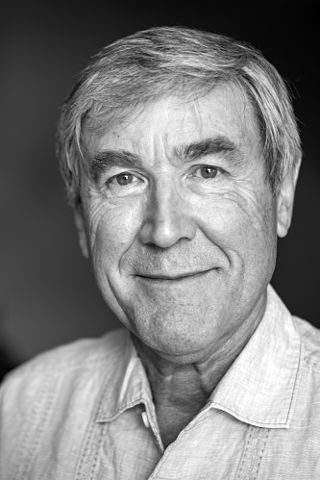
Paul Charles William Davies is an English physicist, writer and broadcaster, a professor in Arizona State University and director of BEYOND: Center for Fundamental Concepts in Science. He is affiliated with the Institute for Quantum Studies in Chapman University in California. He previously held academic appointments in the University of Cambridge, University College London, University of Newcastle upon Tyne, University of Adelaide and Macquarie University. His research interests are in the fields of cosmology, quantum field theory, and astrobiology.

Lewis Thomas was an American physician, poet, etymologist, essayist, administrator, educator, policy advisor, and researcher.

John Allen Paulos is an American professor of mathematics at Temple University in Philadelphia, Pennsylvania. He has gained fame as a writer and speaker on mathematics and the importance of mathematical literacy. Paulos writes about many subjects, especially of the dangers of mathematical innumeracy; that is, the layperson's misconceptions about numbers, probability, and logic.
Popular mathematics is mathematical presentation aimed at a general audience. Sometimes this is in the form of books which require no mathematical background and in other cases it is in the form of expository articles written by professional mathematicians to reach out to others working in different areas.
Statistical literacy is the ability to understand and reason with statistics and data. The abilities to understand and reason with data, or arguments that use data, are necessary for citizens to understand material presented in publications such as newspapers, television, and the Internet. However, scientists also need to develop statistical literacy so that they can both produce rigorous and reproducible research and consume it. Numeracy is an element of being statistically literate and in some models of statistical literacy, or for some populations, it is a prerequisite skill. Being statistically literate is sometimes taken to include having the abilities to both critically evaluate statistical material and appreciate the relevance of statistically-based approaches to all aspects of life in general or to the evaluating, design, and/or production of scientific work.
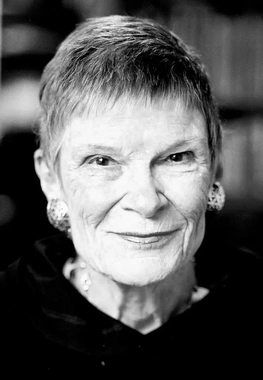
Constance Bowman Reid was the author of several biographies of mathematicians and popular books about mathematics. She received several awards for mathematical exposition. She was not a mathematician but came from a mathematical family—one of her sisters was Julia Robinson, and her brother-in-law was Raphael M. Robinson.

Amir Dan Aczel was an Israeli-born American lecturer in mathematics and the history of mathematics and science, and an author of popular books on mathematics and science.

The Collapse of Chaos: Discovering Simplicity in a Complex World (1994) is a book about complexity theory and the nature of scientific explanation written by biologist Jack Cohen and mathematician Ian Stewart.
The Edge Foundation, Inc. is an association of science and technology intellectuals created in 1988 as an outgrowth of The Reality Club. Its main activities are reflected on the edge.org website, edited by publisher and businessman John Brockman. The site is a critically noted online magazine exploring scientific and intellectual ideas. In 2019, BuzzFeed News reviewed Edge’s IRS filings and reported that Jeffrey Epstein was "by far its largest financial donor", and that "his association with Edge gave him access to leading scientists and figures in the tech industry."

The Information: A History, a Theory, a Flood is a book by science history writer James Gleick, published in March 2011, which covers the genesis of the current information age. It was on The New York Times best-seller list for three weeks following its debut.
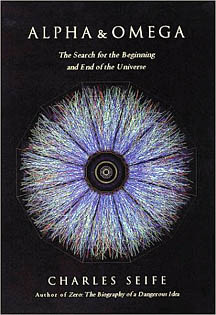
Alpha & Omega: The Search for the Beginning and End of the Universe is the second non-fiction book by Charles Seife, published by Viking, a division of Penguin Putnam, in 2003.
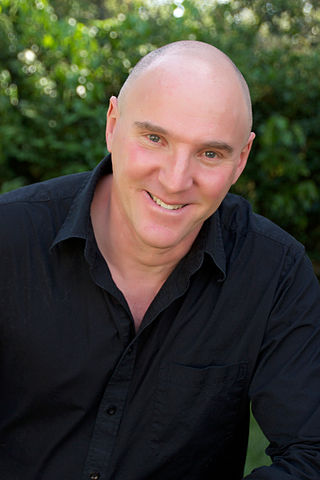
Amir Alexander is a historian, author, and academic who studies the interconnections between mathematics and its cultural and historical setting.

Zero: The Biography of a Dangerous Idea is a non-fiction book by American author and journalist Charles Seife. The book was initially released on February 7, 2000, by Viking.

Decoding the Universe: How the New Science of Information Is Explaining Everything in the Cosmos, from Our Brains to Black Holes is the third non-fiction book by American author and journalist Charles Seife. The book was initially published on January 30, 2007 by Viking.
References
- ↑ Greenwood, Katherine Federici (13 October 2010). Numbers can mislead - Charles Seife ’93 reveals mischief behind data, Princeton Alumni Weekly
- 1 2 3 Journalism at NYU - Faculty Archived April 6, 2008, at the Wayback Machine
- ↑ Seife, Charles (2000). Zero: The Biography of a Dangerous Idea . New York: Penguin Books. ISBN 9780140296471.
- ↑ Seife, Charles (2010). Proofiness: How You're Being Fooled by the Numbers. New York: Penguin. ISBN 978-0-14-312007-0.
- ↑ Steven Strogatz, Fibbing With Numbers, The New York Times, 17 September 2010
- ↑ Seife, Charles (2008). Sun in a Bottle: The Strange History of Fusion and the Science of Wishful Thinking. ISBN 9780670020331.
- ↑ Seife, Charles (2015-08-04). Virtual Unreality: The New Era of Digital Deception. ISBN 9780143127673; pbk
{{cite book}}: CS1 maint: postscript (link) - ↑ Seife, Charles (2021). Hawking Hawking: The Selling of a Scientific Celebrity. Basic Books. ISBN 978-1-5416-1837-4.